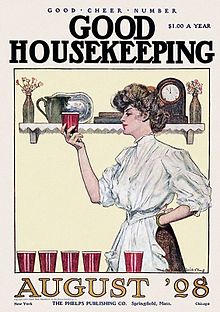

Homemaking is mainly an American and Canadian term for the management of a home, otherwise known as housework, housekeeping, housewifery or household management. It is the act of overseeing the organizational, day-to-day operations of a house or estate, and the managing of other domestic concerns. A person in charge of the homemaking, who is not employed outside the home, in the US and Canada, is called a homemaker, a term for a housewife or a stay-at-home dad. Historically the role of homemaker was often assumed by women. The term "homemaker", however, may also refer to a social worker who manages a household during the incapacity of the housewife or househusband.[1] Home health workers assume the role of homemakers when caring for elderly individuals. This includes preparing meals, giving baths, and any duties the person in need cannot perform for themselves.
Homemaking can be the full-time responsibility of one spouse, partner, or parent, shared with children or extended family, or shared or traded between spouses/partners as one or both work outside the home. It can also be outsourced partially or completely to paid help. In previous decades, there were a number of mandatory courses available for students to learn the skills of homemaking. In high school, courses included cooking, nutrition, home economics, family and consumer science (FACS), and food and cooking hygiene. [citation needed]
- ^ "homemaker - definition of homemaker by The Free Dictionary". Thefreedictionary.com. Retrieved 2015-07-02.